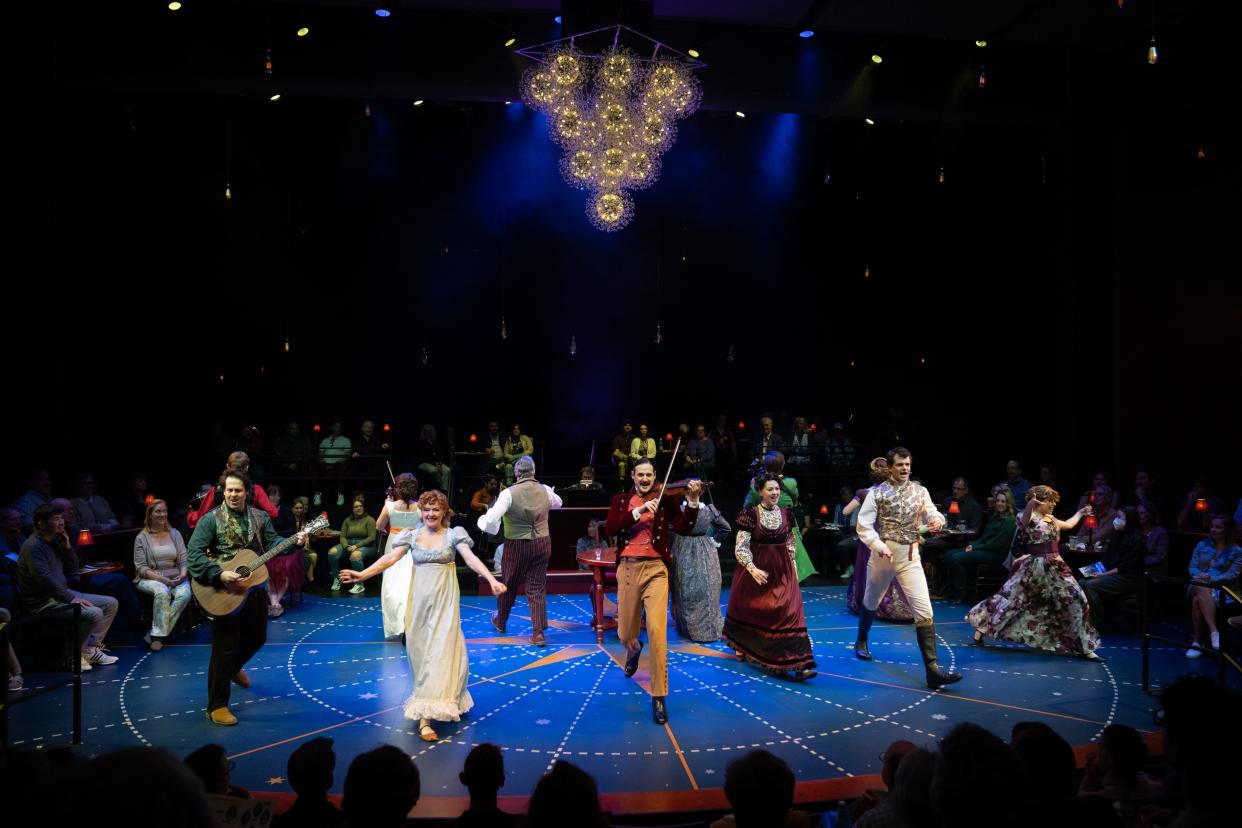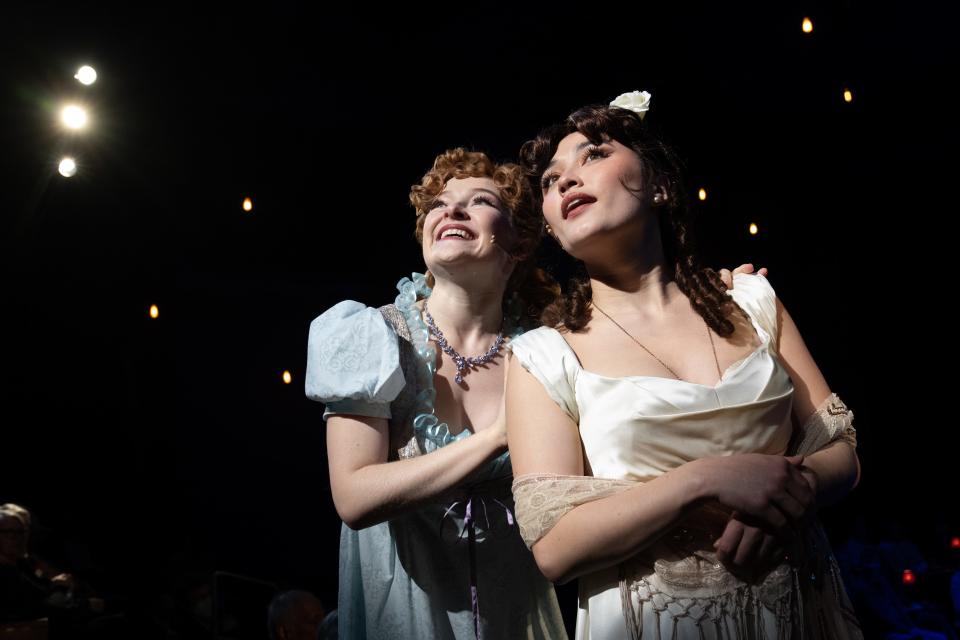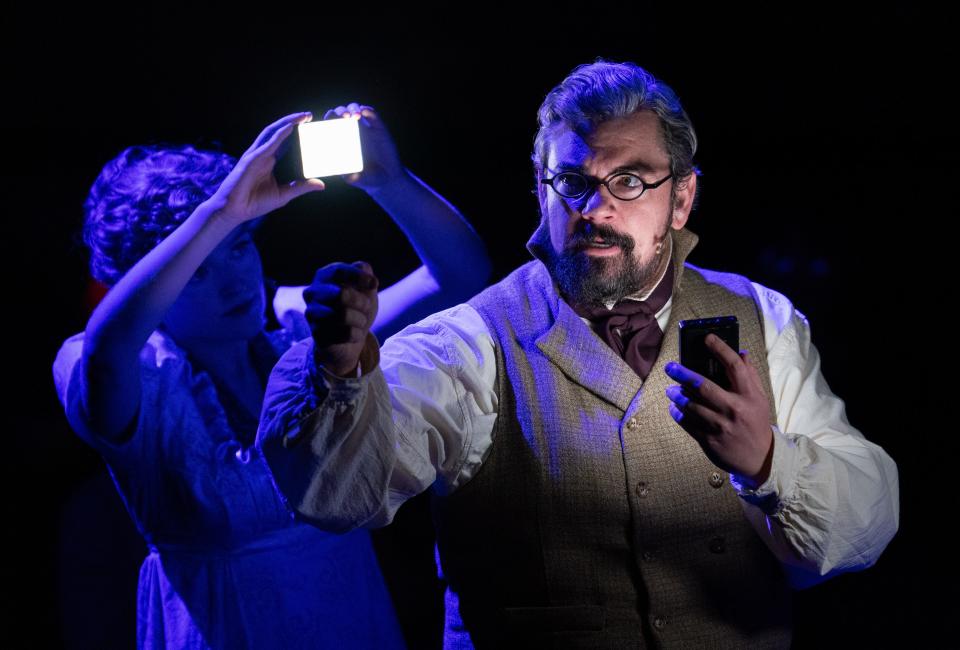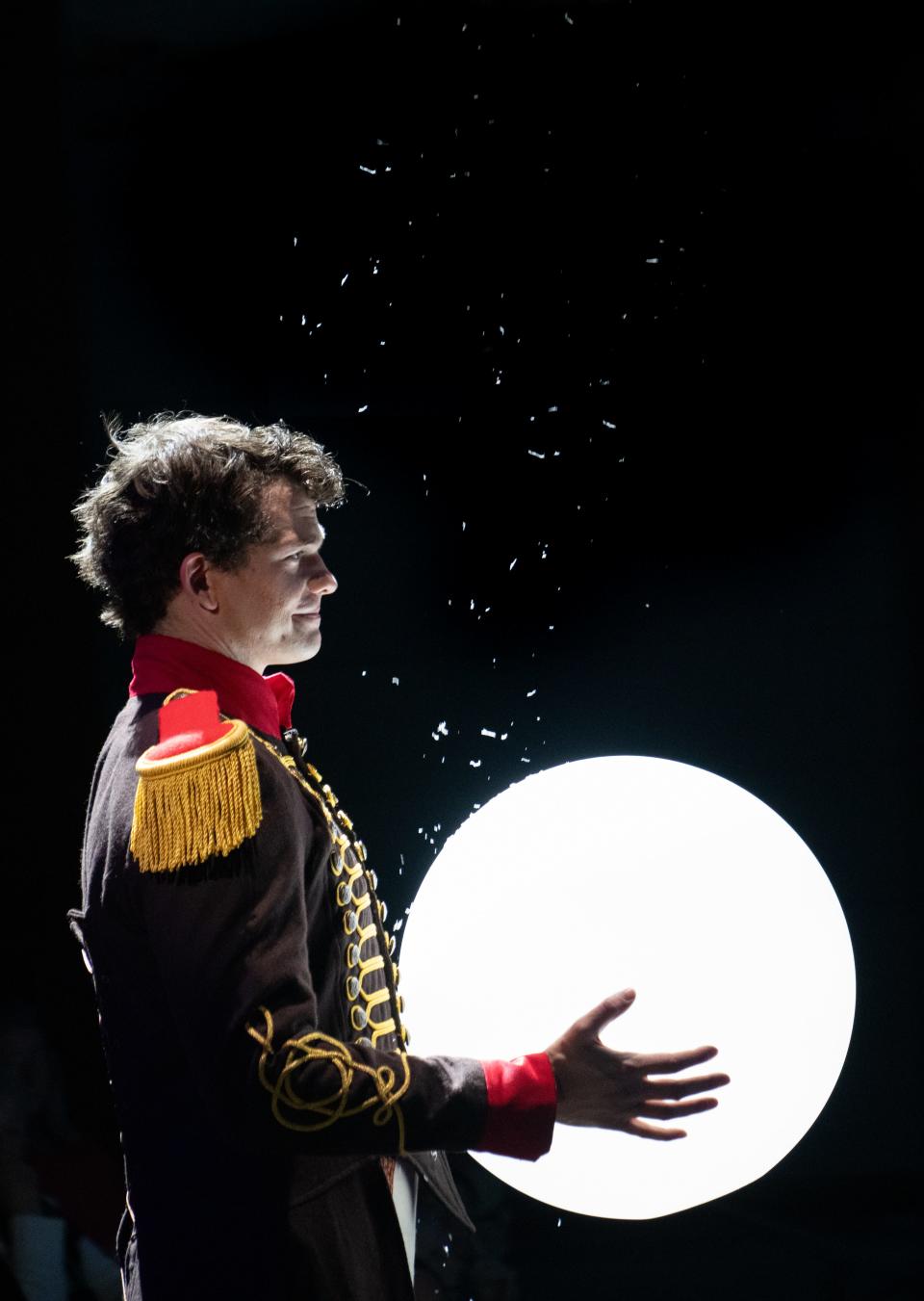'High theatrical orbit': 10 reasons to absolutely see "The Great Comet" at Zach Theatre

- Oops!Something went wrong.Please try again later.
- Oops!Something went wrong.Please try again later.
In general, classic 19th-century novels do not make hit Broadway musicals.
Off the top of my head, I can think of just seven long-running Broadway musicals adapted directly from European or American novels of the 1800s — or the first few years of the 1900s — despite the thousands of novels published during that period.
That said, some of those seven winners did very well indeed.
"The Phantom of the Opera" from "The Phantom of the Opera" by Gaston Leroux (13,981 performances).
"Les Miserables" from "Les Miserables" by Victor Hugo (6,680 performances, then 1,024 more in a revival).
"The Wiz" from "The Wonderful Wizard of Oz" by L. Frank Baum (1,672 performances).
"Jekyll and Hyde" from "The Strange Case of Dr. Jekyll and Mr. Hyde" by Robert Louis Stevenson (1,543 performances).
"Big River" from "The Adventures of Huckleberry Finn" by Mark Twain (1,005 performances).
"Oliver!" from "Oliver Twist" by Charles Dickens (774 performances).
"The Mystery of Edwin Drood" from "The Mystery of Edwin Drood," the unfinished novel by Charles Dickens (608 performances).
More: 'Only connect': An LGBTQ 'Inheritance' at Zach Theatre in Austin
Consider, then, the case of "Natasha, Pierre and the Great Comet of 1812," adapted from a 70-page slice of Leo Tolstoy's 1,200-page masterpiece, "War and Peace."
It ran a respectable 336 performances on Broadway before closing on Sept. 3, 2017. Still, investors lost most of the show's $14 million capitalization, in part because of a social media firestorm that followed the announced replacement of a Black actor with a white one.
Now Zach Theatre has made a case for sending "The Great Comet" back into high theatrical orbit with a delirious and delicious staging that continues through March 3.

Here are 10 reasons you absolutely should see it.
You can actually understand Tolstoy's story
Tolstoy's novel can be notoriously hard to follow. The number of characters identified by multiple and confusing Russian names is overwhelming, at least at first. Not to mention the long sequences of untranslated French. (I read and thoroughly enjoyed the novel recently, and I still get lost.) The musical, written by Dave Malloy, provides a sing-song "Prologue" that, through repeated memory prompts, helps with sorting out the plot. It also happily urges the audience to reread the synopsis in the printed program.
Not war, but rather peace from the Tolstoy novel
My recent reading of the novel convinced me that Tolstoy is far better at war than at peace. His treatment of the fog of battle is unmatched. You can tell that Russian President Vladimir Putin has forgotten a lesson from Tolstoy's Napoleonic Wars: The closer your invading armies drive toward a country's heartland, the harder your enemy fights. Because of the scale, most stage treatments of "War and Peace" focus instead on the deeply etched character portraits, the scrambled romances and the extended family dramas that take place on the home front. "The Great Comet" tightens the narrative focus even further.
More: Tangling with Texas and sexuality in Terrence McNally’s plays
Wrap-around staging at its Zach best
For some 30 years, Zach Theatre artistic director Dave Steakley has mixed audiences with actors. This friendly gesture can be a delicate thing, since some viewers are not interested in being viewed as part of the stage action. Bob Lavallee, who designed the scenery and properties for "The Great Comet," has refined Steakley's efforts by creating a blue island platform for a stage that reaches far into the Topfer Theatre's house. Then he positioned tables and seats adroitly around that central playing area. Meanwhile, Steakley stages action all over remaining house as well. We call this blend of audience and actors "environmental staging," but I'm not sure that term rises to the power of the actual experience.
A smorgasbord of musical influences
Many of Malloy's songs in "The Great Comet" would be at home in any standard American Broadway score. Others affirm unabashed pop, rock or dance influences. Still others pick up Russian folk themes. All the sounds are shaped by music director Allen Robertson, whose impish presence onstage with a small band is amplified by performers who play instruments throughout the theatrical space.
More: 'Unrolls like a film': Austin's Zach Theatre is back with immersive outdoor 'Into the Woods'
Bodies in nearly constant motion
This is not a musical that sits still. During a few of the introspective scenes, major characters assume a more rooted presence on the stage. At all other times, dance maker Josh Assor streams his frenetic performers fluidly up one side of the performance space and down the other. One particularly funny scene mocks the operatic movement of the period.
Grounded costumes, elevated lighting
Costume designer Susan Branch Towne can do anything. In the course of one Austin season, she can whip up as many creative accoutrements as one theater company can handle. For "The Great Comet," however, Towne wisely did not try to compete with the kinetic visual world in which these actors perform. Her costumes are historically convincing, with alterations to accommodate the circus-like activity executed in them. On the other hand, lighting designer Austin Brown has been given a free hand to light a lot of space not usually set aside for performance, and also to create special effects that include hand-held devices, mysterious globes and, of course, references to the climactic comet.

Natasha and Pierre grow up
It helps to cast titular characters with actors who can completely embody them. Initially, Kelley Belarmino and Ryan Everett Wood give Natasha and Pierre a winning sort of reckless innocence, even if Pierre's is wrapped up in brooding and dissolution. In the most crucial arc of the story, they grow up. Or at least part way, because in the novel, that process takes several hundred more pages. Natasha's response to a double betrayal matches Pierre's aroused empathy and awakened sense of life's purpose. And, oh yes, Belarmino and Wood can sing up a storm.
More: For this modern twist on 'The Sound of Music,' Austin audiences are part of the action
Stellar turns among the supporting cast
Tolstoy writes no one-dimensional characters. Anatole (smooth Jackson Mettek) is a seducer but also a thrilling risk taker. Sonya (perceptive Daisy Wright) is a caregiver with uncommon insight. Hélène (songstress Carmella Lorenzo Manapat) is a conniving adulterer, but also an unwitting conduit for change. Marya (always-intelligent Meredith McCall), at times the only adult character onstage, acts quickly to protect her house and her charges from danger. Andrey (adroit Hayden Stanes) is rightly portrayed as a cruelly distracted and detached figure rather than as the military hero and morally upright future husband that he considers himself to be.

Right-sizing 'The Great Comet'
This show started in a tiny cabaret theater in New York's Hell's Kitchen and then moved into a tent in the Meatpacking District. Staged originally by the provocative theater company Ars Nova, it later wandered to a large theater with a sprawling set (and budget) on Broadway, which by some accounts made it even harder to follow the story. The Topfer Theatre, though not insubstantial, is small enough — and well designed enough — that there isn't a bad seat in the house. And with the temporary performance island in the middle, the show seamlessly fills the entire room, somewhat like Hal Prince's 1974 revival of "Candide" with its ramps, bridges, walkways and platforms.
More: Theatrical firecracker Monique Midgette stages a modern 'Noises Off' at Zach Theatre
The apotheosis of the Steakley style
Critics sometimes attempt to explain Steakley's long and durable artistic ascendancy by way of one or two lazily conceived notions. He is either the producer of lavishly imaginative musicals, which are always given those creative "Steakley" twists that admittedly sometimes go too far. Or else he is the mastermind behind epic modern dramas, sometimes presented in long, absorbing cycles, laced with social or political import, in the manner of "Angels in America." The Steakley style contains both of those impulses and more. From the opening scene, "Great Comet" is an animated, eye-filling musical, but also a sustained look at vexing aspects of the human condition. Why do we love the people we love? Why do we put up with inarguably cruel or thoughtless actions? How do we as a community engender one outcome and not the other?
'Natasha, Pierre & the Great Comet of 1812'
When: 7:30 p.m. Wednesdays, Thursdays and Fridays, 2:30 p.m. and 7:30 p.m. Saturdays, and 2:30 p.m. Sundays through March 3
Where: Topfer Theatre at Zach Theatre, 202 S. Lamar Blvd. (Onsite parking is $12. Street parking in the area is sometimes available.)
Tickets: Start at $25
Info: zachtheatre.org
This article originally appeared on Austin American-Statesman: 10 reasons to absolutely see "The Great Comet" at Zach Theatre

